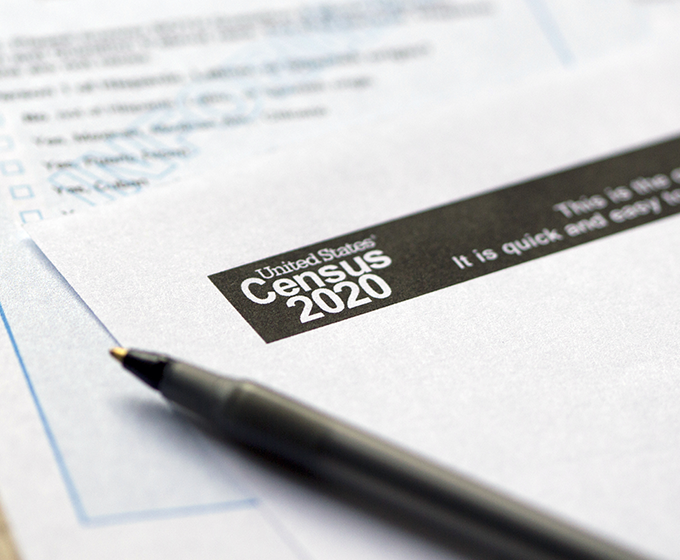
JUNE 10, 2020 — Jeffrey Howard, an assistant professor in the College for Health, Community and Policy at UTSA, is researching and evaluating census privacy and the effect it has on racial and ethnic minorities.
Howard is part of a team of researchers led by Alexis Santos, an assistant professor of human development and family studies at Penn State University, and Ashton Verdery, an assistant professor of sociology, demography and social data analytics at Penn State.
For the 2020 census, the U.S. Census Bureau is proposing to use differential privacy, a new method that attempts to protect the identities of individuals when publishing public data. Census data are used to distribute federal funding that broadly impacts communities and also determines congressional representation.
In this study, recently published in Proceedings of the National Academy of Sciences, the researchers examined the mortality rates based on 2010 census data, and tested the ramifications of applying the proposed differential privacy algorithm to released data by studying estimates of U.S. mortality rates for the overall population and three major racial and ethnic groups. They then compared the newly proposed and the existing methods of privacy protection to see how this would impact racial and ethnic mortality disparities in the U.S.
“What the results of our study show is that the currently proposed method for protecting privacy in the 2020 census results in significant under- and overcounting of the population, compared to previous methods,” said Howard.
The research team also discovered that when differential privacy method was used on census data, it produced dramatic changes in population counts—but primarily for racial and ethnic minority groups and not the white population.
“Professor Howard’s work on overcounting and undercounting in the census is critical because we use census results to assign appropriations and as a basis for all other demographic calculations,” said Lynne Cossman, dean of the College for Health, Community and Policy and Mark G. Yudof Endowed Professor.
The research findings also showed some discrepancies between the two methods of data analysis exceeded a 10% difference. Such a difference could have a crucial impact on our understanding of racial and ethnic health disparities, congressional representation, and how much money certain programs receive for a specific geographic area.
The research is particularly timely in the wake of current events surrounding the death of George Floyd and the ongoing protests against systemic racism in the U.S.
“If racial and ethnic minority populations are not counted properly, they will not be represented properly in government, areas in which they live will not get the appropriate critical resources, and any population-based measures—including poverty and unemployment rates—will not be properly calculated,” Cossman added.
⇒ Explore research in the College for Health, Community and Policy at UTSA.
Santos and Howard have previously collaborated on research examining excess mortality in Puerto Rico following Hurricane Maria. They are also alumni of the UTSA doctoral program in applied demography, also housed in the College for Health, Community and Policy.
Howard’s expertise includes studying how exposure to traumatic events and environments, including war, violence and discrimination, contributes to accelerated aging and mortality. He is also a lead researcher for the Consequences of Trauma Working Group, a research group in the Center for Community-Based and Applied Health Research at UTSA.
UTSA Today is produced by University Communications and Marketing, the official news source of The University of Texas at San Antonio. Send your feedback to news@utsa.edu. Keep up-to-date on UTSA news by visiting UTSA Today. Connect with UTSA online at Facebook, Twitter, Youtube and Instagram.
Move In To COLFA is strongly recommended for new students in COLFA. It gives you the chance to learn about the Student Success Center, campus resources and meet new friends!
Academic Classroom: Lecture Hall (MH 2.01.10,) McKinney Humanities BldgWe invite you to join us for Birds Up! Downtown, an exciting welcome back event designed to connect students with the different departments at the Downtown Campus. Students will have the opportunity to learn about some of the departments on campus, gain access to different resources, and collect some giveaways!
Bill Miller PlazaCome and celebrate this year's homecoming at the Downtown Campus with food, games, giveaways, music, and more. We look forward to seeing your Roadrunner Spirit!
Bill Miller PlazaThe University of Texas at San Antonio is dedicated to the advancement of knowledge through research and discovery, teaching and learning, community engagement and public service. As an institution of access and excellence, UTSA embraces multicultural traditions and serves as a center for intellectual and creative resources as well as a catalyst for socioeconomic development and the commercialization of intellectual property - for Texas, the nation and the world.
To be a premier public research university, providing access to educational excellence and preparing citizen leaders for the global environment.
We encourage an environment of dialogue and discovery, where integrity, excellence, respect, collaboration and innovation are fostered.